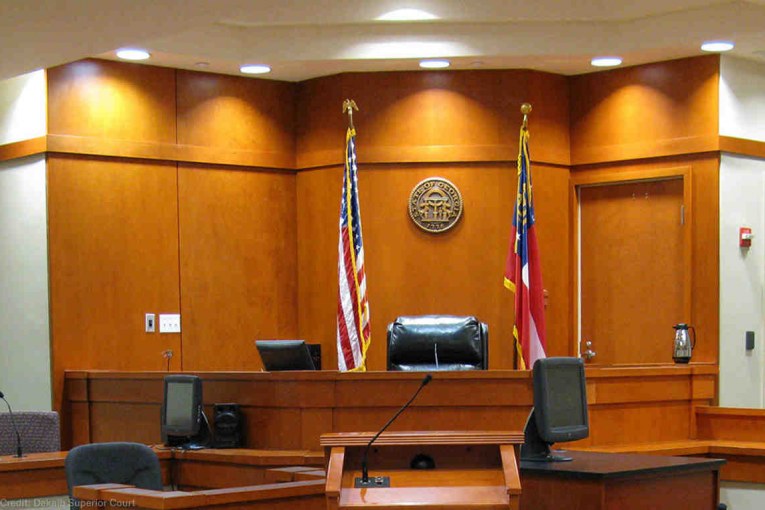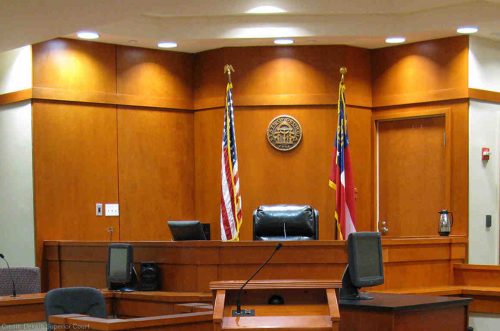
 By Andrea Young
By Andrea Young
Charles “Skip” Eckartz, a 63-year-old disabled veteran, and his wife, Virginia “Ginny” Eckartz, were arrested in their Georgia home for manufacturing marijuana. They were incarcerated for five days until Ginny was able to use the small inheritance she’d received after her mother’s death as collateral for their bond.
Although all of the charges were dropped against his wife, Skip accepted a plea agreement that allowed him to avoid a felony conviction and up to 10 years in prison. Skip, who had no criminal history, was sentenced to five years of felony probation under the First Offender Act in Georgia.
Unfortunately, Skip didn’t realize that probation, which is promoted as a way to keep people out of jail and prison, is actually one of Georgia’s main feeder systems of incarceration. In 2016, Georgia had more people on felony probation — close to 206,000 people on felony probation — than any other state in the nation.
In addition to his sentence, Skip was ordered to pay a $5,000 fine plus court costs and fees. The Eckartzes survive on a fixed income of $965.89 a month. They net just under $12,000 a year, and owe the state almost $10,000 in fees and fines that Skip is required to pay as a condition of probation. The result: Skip is forced to decide between paying the lease on his home, or fines and fees. He lives with the constant threat that if he continues to miss payments, he could be thrown into prison and given a criminal record for the first time in his life.
There are thousands of people on probation in Georgia facing similarly grim prospects. It is true that probation is typically preferable to imprisonment. However, people convicted of felonies  spend, on average, over six years on probation in Georgia. The lengthy supervision terms contribute to high rates of recidivism, given the risk of a simple mistake during this time, like a failed drug test, new offense, or the inability to pay fees and fines that are a condition of probation. A Pew study found that probation revocations accounted for 55 percent of all prison admissions in Georgia.
spend, on average, over six years on probation in Georgia. The lengthy supervision terms contribute to high rates of recidivism, given the risk of a simple mistake during this time, like a failed drug test, new offense, or the inability to pay fees and fines that are a condition of probation. A Pew study found that probation revocations accounted for 55 percent of all prison admissions in Georgia.
The problem isn’t limited to probation in cases of felonies, and in fact can be even worse for people sentenced for low-level offenses. In Georgia, misdemeanors also carry the possibility of probation, in addition to hefty fees and fines. And unlike many other states, people sentenced for these low level offenses in Georgia are often placed on “pay-only” probation—probation imposed just because a person cannot afford to pay fines and fees. Private probation companies, which oversee misdemeanor probation in the state, generate mass profits off the mass incarceration system. Thus, private probation, along with the practice of using cash bail for low level offenses, have turned Georgia’s jails into debtor’s prisons.
For example, in Georgia, a traffic offense, such as a speeding ticket or driving with a suspended license, can result in fees and fines of up to $1,000. While putting a person who cannot afford to pay on probation may prevent them from being immediately incarcerated, it requires the individual to pay additional monthly supervision fees to the private probation company on top of the original fines, causing sums to multiply and making it more likely the person will miss a payment and be jailed. Thus, the entire practice of using probation to collect debts for minor offenses is itself highly questionable.
There is insufficient oversight over how these companies collect fines and fees, and whether they abide by constitutional standards. As a result, Georgians have been forced to pay additional fees to private probation companies for GPS ankle monitors and alcohol and drug testing, even without a judge’s order. Furthermore, when a poor person falls behind on their payments, they are threatened with the prospect of incarceration in violation of basic rights to a hearing and representation by counsel.
Recent years have seen some improvements to this grim reality. After receiving a traffic ticket in 2015, Kevin Thompson, a teenager at the time, was placed on probation with a company called Judicial Correction Services, Inc. (JCS) and required to pay not only his court fines but also the company’s supervision fees in 30 days. Thompson did his best to pay JCS by doing odd jobs despite the fact that he was an unemployed teenager, who did not have a valid driver’s license. But when he couldn’t pay, he was jailed  for five days.
for five days.
The ACLU filed a federal lawsuit against DeKalb County and JCS, charging that Thompson’s constitutional rights were violated when he didn’t receive an ability-to-pay hearing or counsel. The lawsuit was settled with reforms that changed the way court fines and fees are collected in DeKalb County. The court that unlawfully jailed Thompson adopted a “bench card” guiding judges on how to determine an individual’s ability to pay, use alternatives to jail for the poor, and protect the right to counsel. Ultimately, the state of Georgia entirely dissolved the court that has used private probation to squeeze people like Thompson for money, underscoring just how unlawful the practices challenged by this lawsuit had been.
Thompson’s lawsuit was also part of a broader reform of Georgia’s private probation system. In 2015, Georgia implemented laws to cap fees and limit the length of time probation companies can charge supervision fees. Furthermore, Georgia instituted a hearing requirement before private probation companies can throw people in jail. This caused Sentinel, a private probation company, to leave the state after they could no longer reap huge profits from Georgians on probation. However, other companies, like CSRA Probation Services, continue to get rich by preying on vulnerable populations in the state.
While Georgia has made significant progress in criminal justice reform under Gov. Nathan Deal, there is more work to do. Impactful and lasting criminal justice must both eliminate private probation and reform felony probation so that Georgians aren’t penalized for the amount of money in their pockets.
Andrea Young is the Executive Director of ACLU of Georgia
